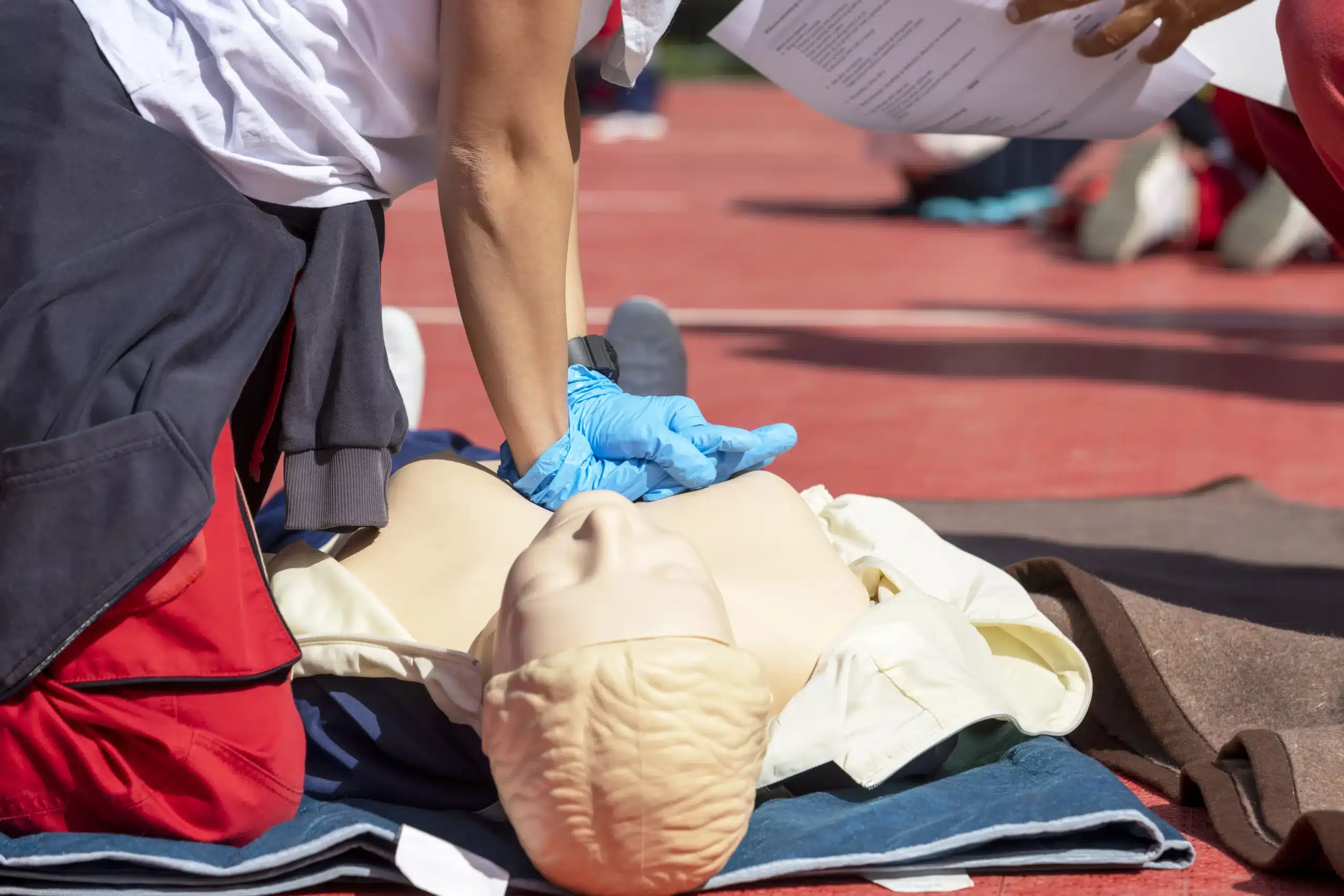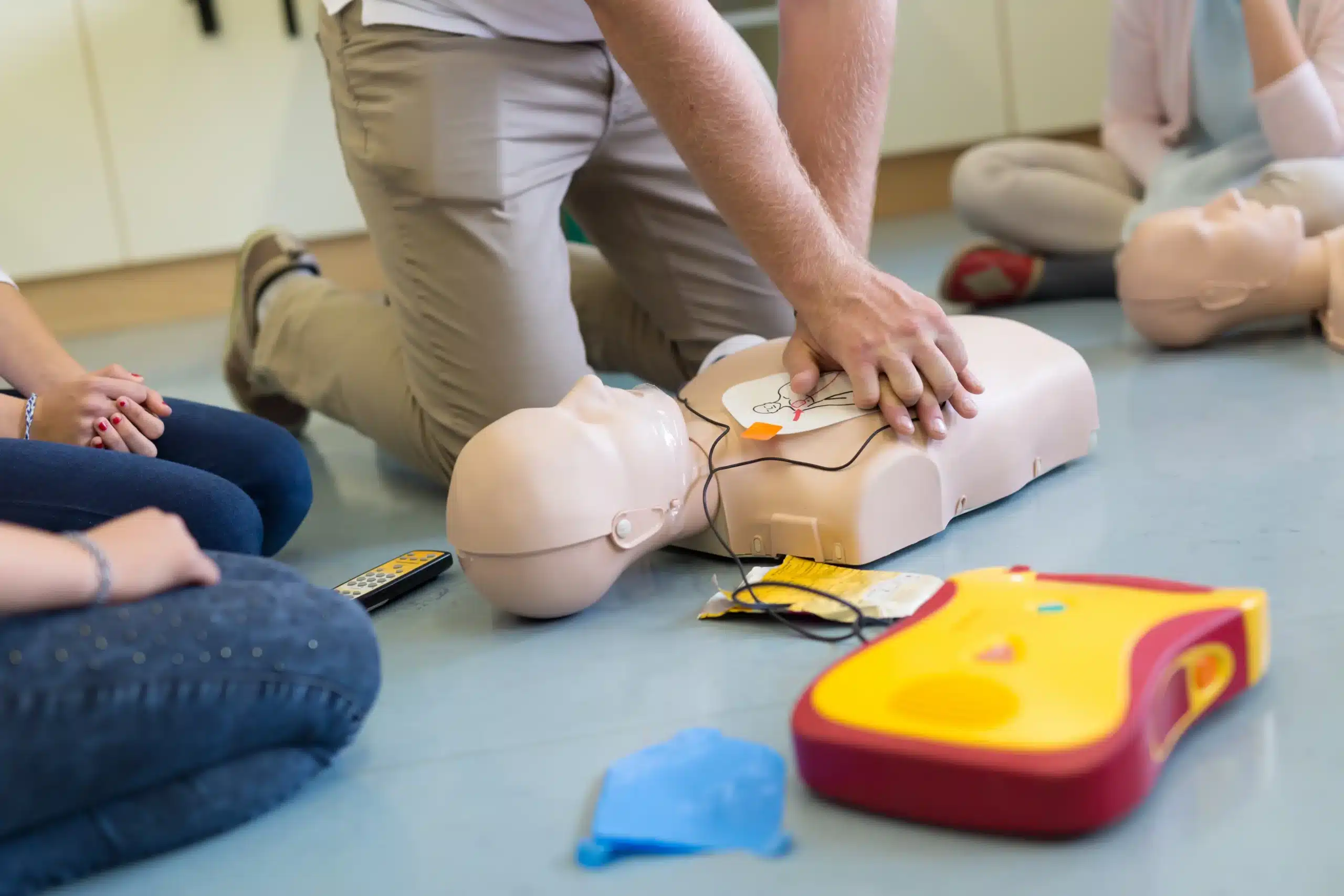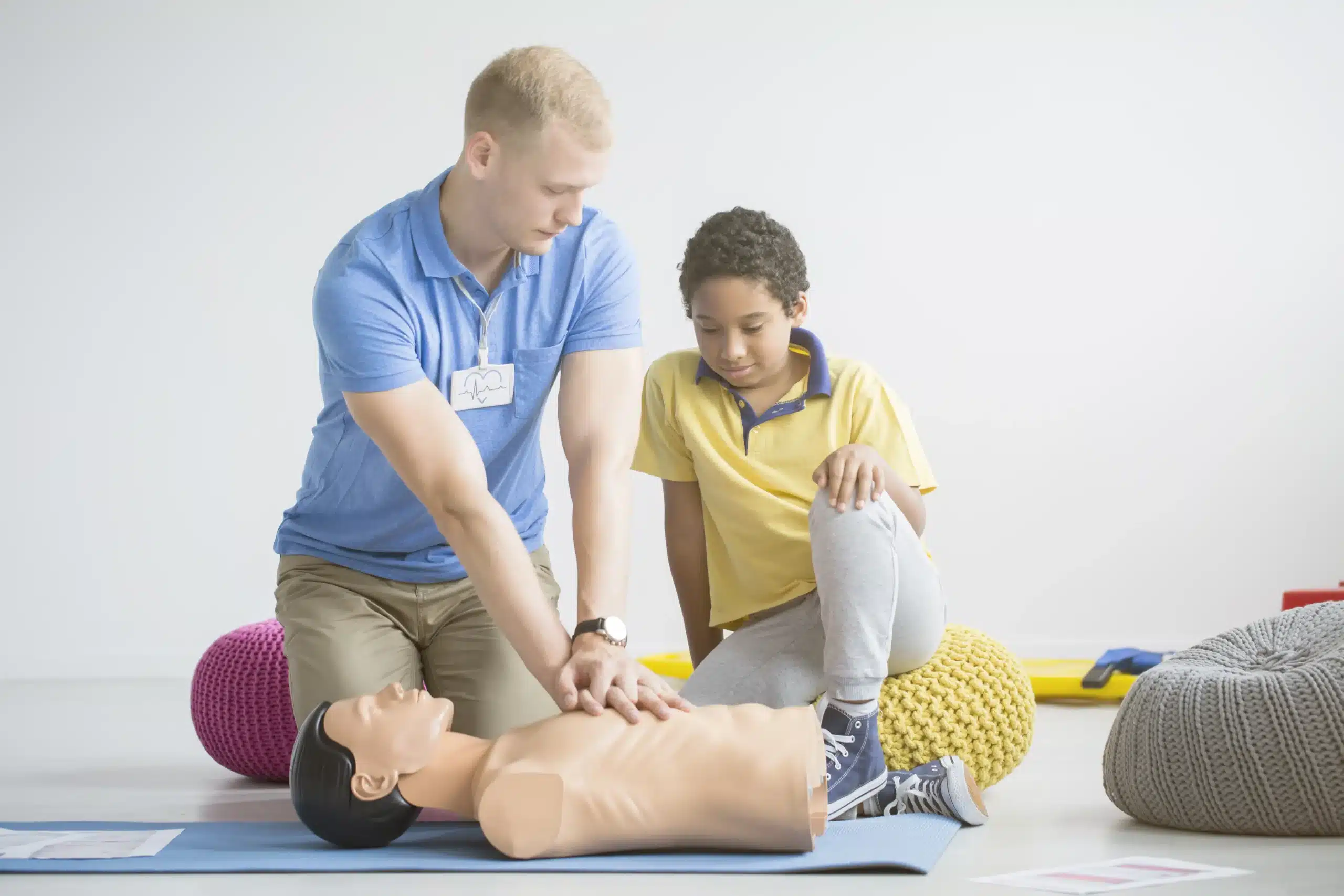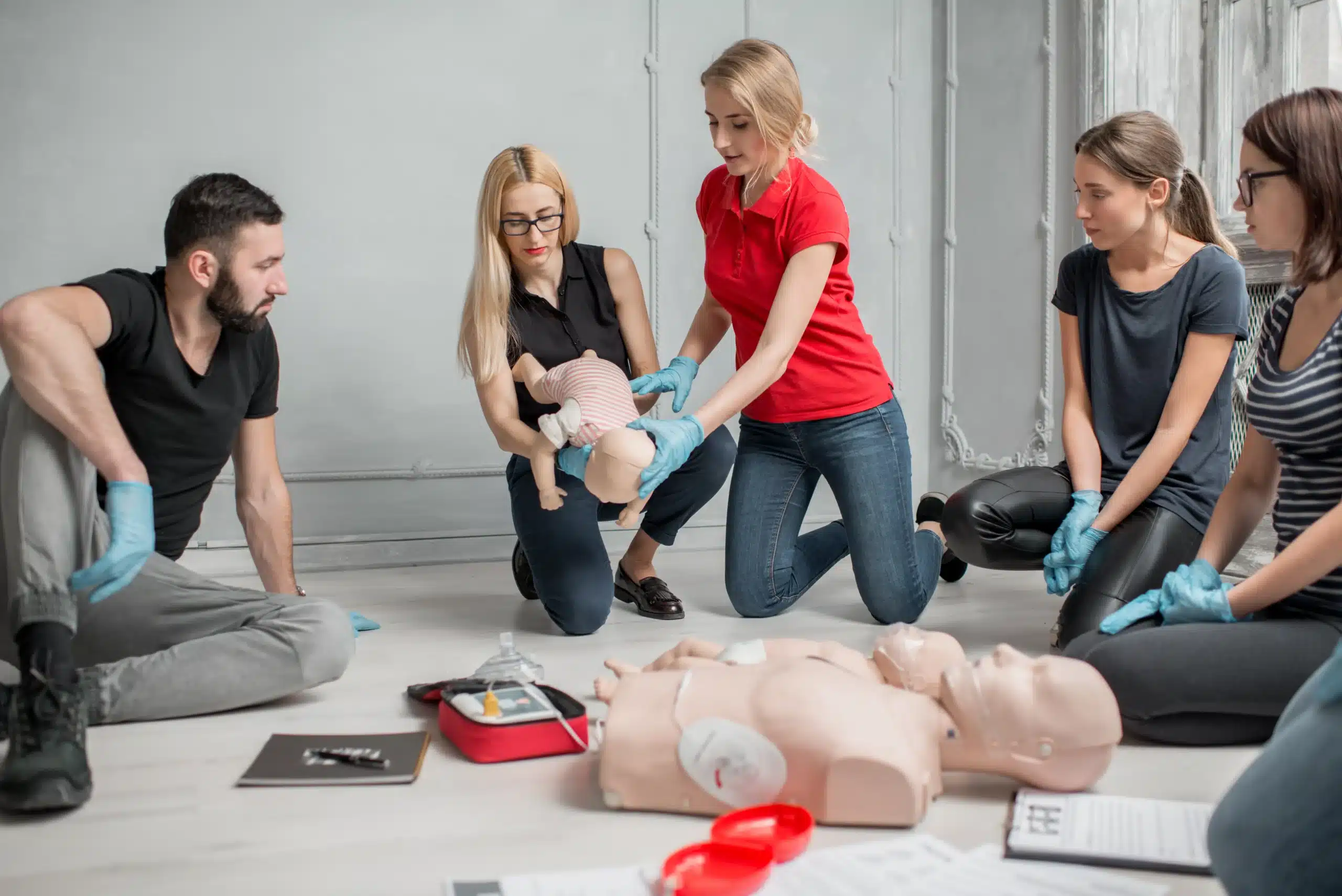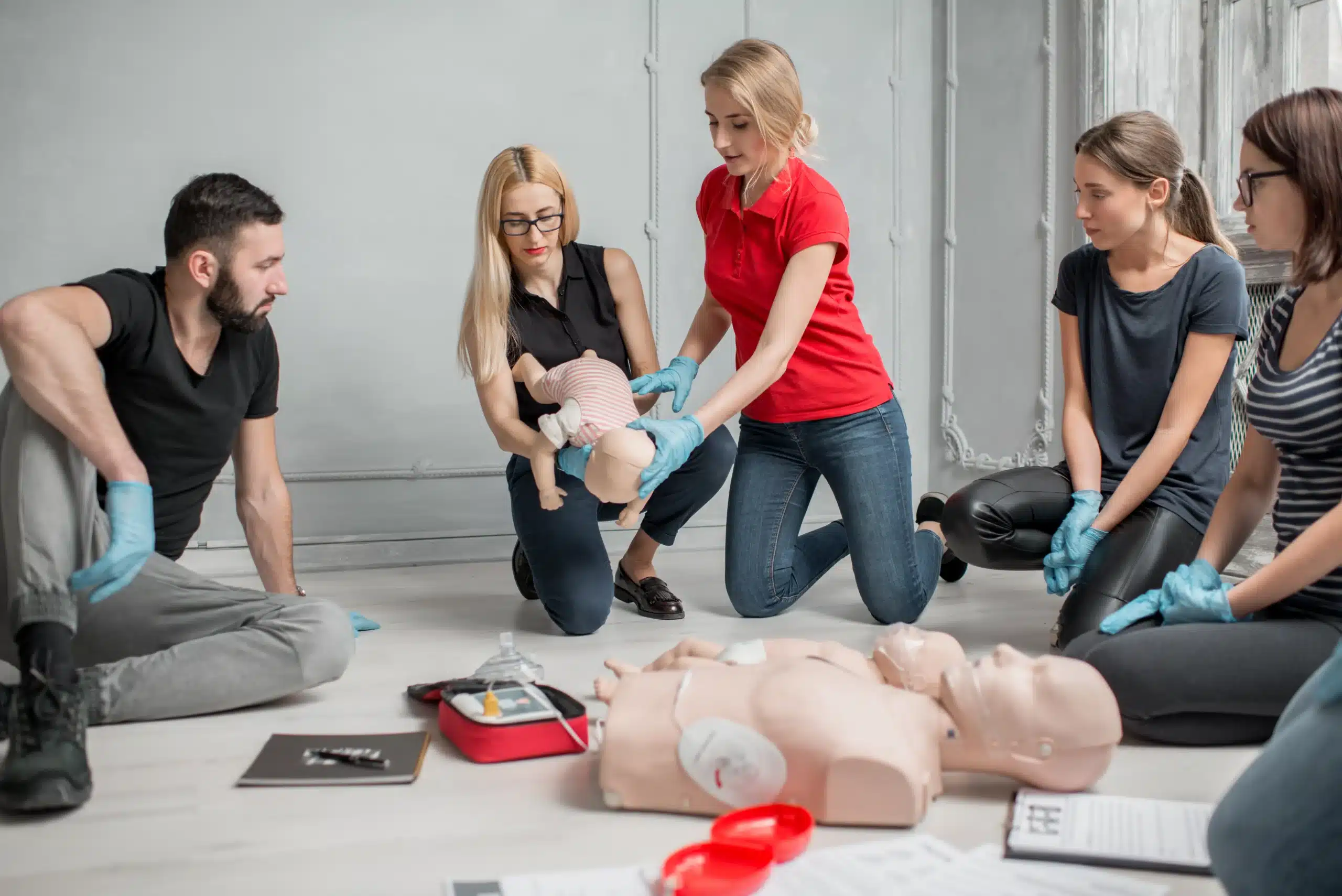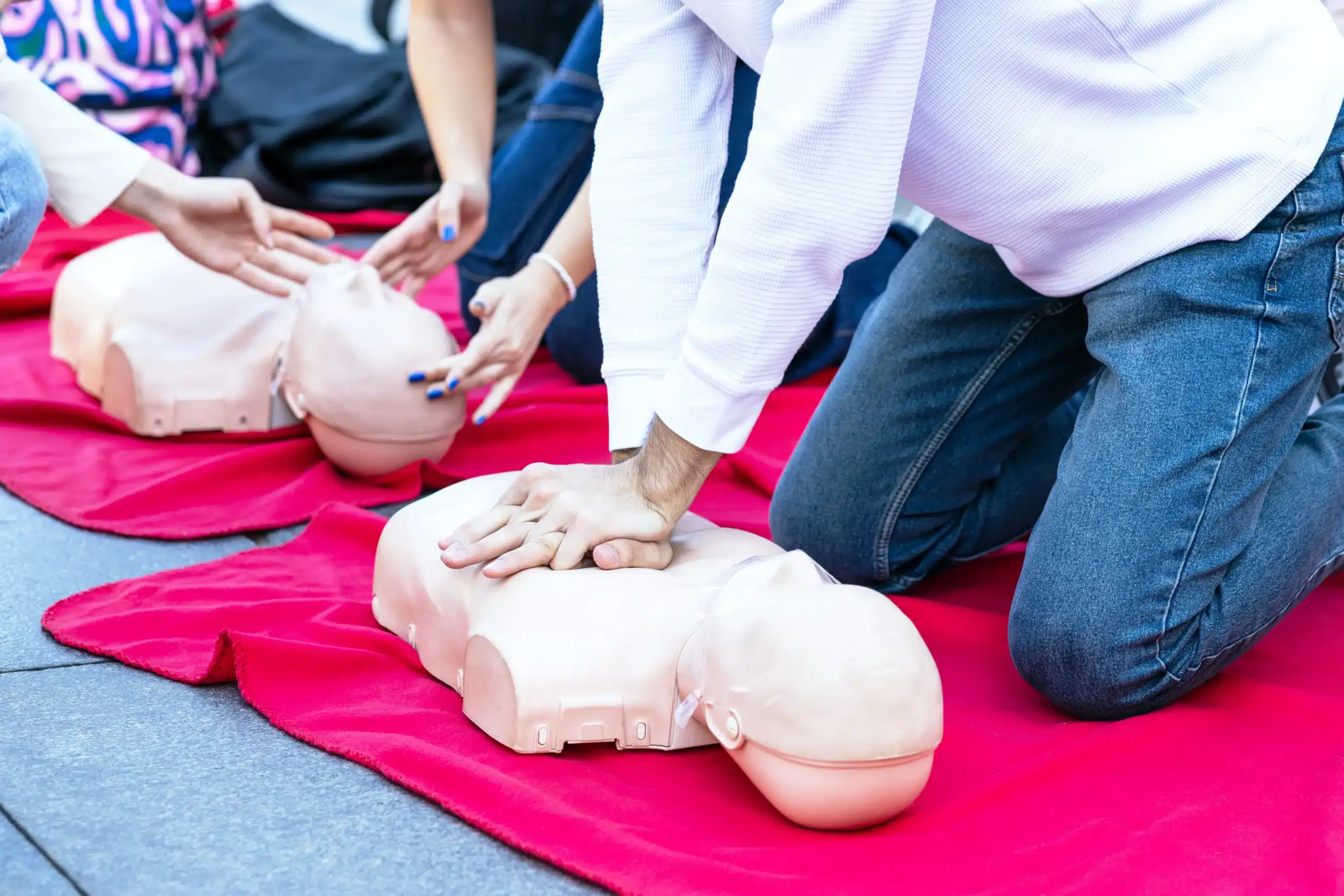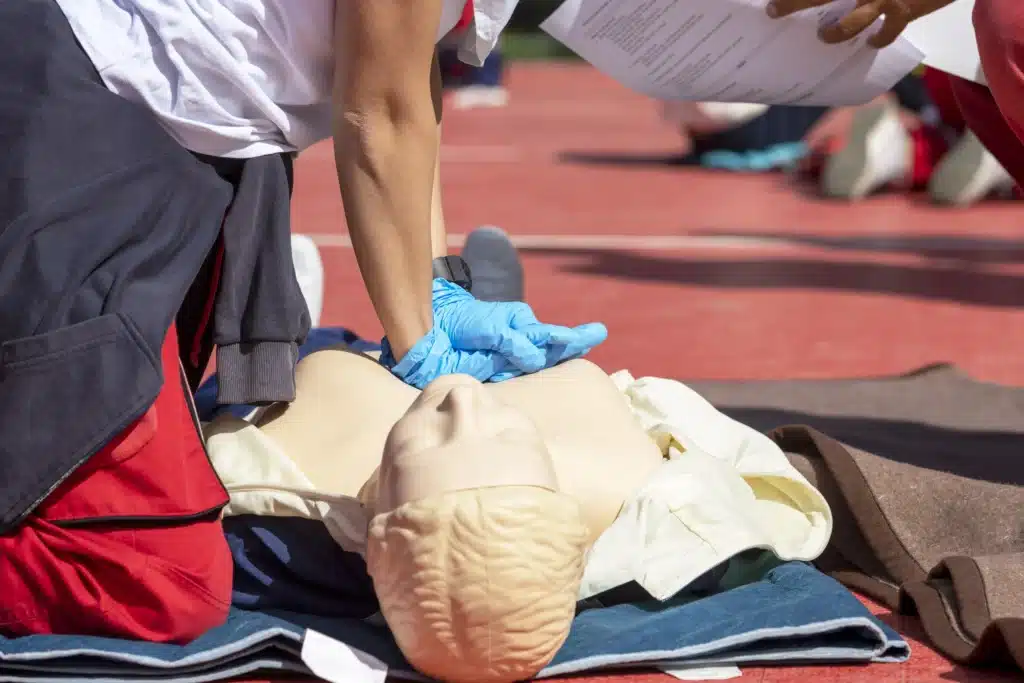Working in healthcare, especially with children, means being ready for anything. From minor bumps and bruises to more serious situations, having the right training can make all the difference. That’s where Pediatric Advanced Life Support (PALS) comes in. This specialized training goes beyond basic CPR, equipping healthcare providers with the advanced skills to handle pediatric emergencies confidently. If you’re a healthcare professional in Richmond, or surrounding areas like Berkeley and Oakland, and you’re looking to enhance your skills and advance your career, understanding the importance of pediatric advanced life support in Richmond is crucial. This article breaks down everything you need to know about PALS certification, from course content and available training options to the impact it can have on your career.
Key Takeaways
- PALS is essential for healthcare professionals treating infants and children: This specialized training provides the advanced skills and knowledge needed to manage pediatric emergencies, covering areas like airway management, resuscitation, and team dynamics.
- Find a PALS course that fits your learning style and schedule: Choose from in-person, online, or hybrid formats, and consider factors like provider reputation and instructor experience when making your decision.
- Stay current with your PALS certification: Renew every two years and explore continuing education opportunities to maintain your skills and stay updated on the latest guidelines. This ensures you’re always prepared to provide the best possible care for young patients.
What is Pediatric Advanced Life Support (PALS)?
Pediatric Advanced Life Support (PALS) is a specialized training program that equips healthcare providers with the knowledge and skills to effectively manage pediatric emergencies. Think of it as the advanced, kid-specific version of CPR. It goes beyond basic life support to address the unique physiological differences and healthcare needs of infants and children. From assessment to intervention, PALS empowers professionals to confidently handle critical situations and improve outcomes for young patients. If you’re a healthcare provider working with children, PALS certification isn’t just beneficial—it’s often essential. At Safety Training Seminars, we offer PALS certification courses designed to meet the needs of healthcare professionals throughout Northern California. We also offer comprehensive training in EMSA Child Care Health & Safety.
Core PALS Training Components
PALS training delves into a range of critical topics, providing a comprehensive approach to pediatric emergency care. You’ll learn advanced airway management techniques specific to infants and children, ensuring you can maintain open airways and provide adequate ventilation during a crisis. The course also covers advanced resuscitation techniques, equipping you with the skills to perform effective CPR and restore circulation. Beyond the hands-on skills, PALS training emphasizes understanding the unique physiology of children and the common health complications that can lead to emergencies. This knowledge is crucial for quick, accurate assessments and effective interventions. Our CPR and First-Aid courses in San Pablo cover many of these fundamental skills. Contact us to learn more about our course offerings.
Why PALS Matters for Healthcare Professionals
PALS certification is more than just a credential—it’s a demonstration of your commitment to providing the highest quality care for young patients. For healthcare professionals working in environments where pediatric emergencies are a possibility, PALS is often a requirement. It signifies that you possess the specialized knowledge and skills to handle critical situations involving infants and children. This specialized training can significantly impact patient outcomes, increasing the chances of survival and minimizing long-term complications. Beyond the technical skills, PALS certification instills confidence, allowing you to react decisively and effectively under pressure. This confidence translates to a more positive experience for both patients and their families during stressful times. Learn more about our commitment to affordable training with our low price guarantee.
Top PALS Certification Providers in Richmond
Finding the right PALS certification course can feel overwhelming. To help you, we’ve compiled a list of reputable providers in Richmond, highlighting what makes each stand out.
Safety Training Seminars
Safety Training Seminars offers American Heart Association-certified courses, including PALS, in over 60 Northern California cities. Their San Pablo location conveniently serves Richmond, Berkeley, and Oakland. They understand the scheduling challenges healthcare providers face and aim to provide flexible PALS course options. They also offer a low price guarantee.
American Heart Association Training Centers
The American Heart Association (AHA) sets the standard for PALS training. AHA Training Centers offer various PALS courses, including Provider, Renewal, and HeartCode PALS. These courses equip healthcare providers with the skills to manage pediatric emergencies, emphasizing high-performance team dynamics and high-quality individual skills. Locating an AHA Training Center near you is a great way to ensure you’re receiving top-tier instruction.
Virginia Commonwealth University (VCU)
VCU’s Center for Trauma and Critical Care Education provides a range of PALS courses, catering to different learning preferences. They offer Provider, Renewal (Traditional and Hybrid), HeartCode PALS, and even Instructor courses. Their focus is on improving the quality of care for children facing medical emergencies.
Health Educators, Inc.
Health Educators, Inc. offers a variety of CPR and First Aid classes in Richmond, VA, including ACLS, BLS, and PALS certifications. They provide both initial certification and renewal courses, making it a convenient option for healthcare professionals seeking to maintain their credentials.
SureFire CPR
SureFire CPR offers both initial and renewal PALS certification courses. Their in-person PALS classes are led by experienced healthcare professionals, such as nurses, EMTs, paramedics, and firefighters, providing students with real-world insights and practical training.
Choose the Right PALS Course Format
Finding the right PALS course format is key to successfully completing your training. Whether you thrive in a classroom or prefer the flexibility of online learning, there’s a PALS course designed for you. Let’s explore the different options: in-person, online, and hybrid, so you can make the best choice for your learning style and schedule.
Benefits of In-Person Training
In-person PALS training offers a hands-on, immersive learning experience. You’ll work directly with instructors and fellow students, practicing essential skills like pediatric assessment and advanced resuscitation techniques in a simulated environment. This face-to-face interaction allows for immediate feedback and clarification, building your confidence in handling real-world pediatric emergencies. The dynamic nature of in-person training can be especially beneficial for those who learn best through direct interaction and practical application. Illinois Safety highlights the importance of simulations and real-life scenarios in PALS classes, emphasizing how these experiences build confidence.
Online PALS Certification (HeartCode PALS)
If you need flexibility, online PALS certification, like HeartCode PALS, might be a good fit. This format lets you learn at your own pace, fitting the training around your busy schedule. Online PALS certification offers the same high-quality content as in-person courses, covering essential topics such as pediatric BLS, airway management, and team dynamics. This option is ideal for busy professionals juggling work, family, and continuing education requirements. You’ll typically complete online modules and then schedule an in-person skills session to demonstrate what you’ve learned.
Hybrid PALS Courses
Hybrid PALS courses combine online learning with hands-on practice. You’ll start by completing self-directed online modules, covering the core PALS concepts. Then, you’ll attend an in-person skills session to practice your techniques under the guidance of an instructor. The American Heart Association describes this blended learning approach as a practical way to balance theory with real-world application. This format can be particularly helpful for those who prefer a structured learning environment but also value the flexibility of online modules.
Match Formats to Learning Styles
When choosing a PALS course format, consider how you learn best. Do you prefer hands-on practice or independent study? Reflect on your past learning experiences and identify what’s worked well for you. Practice questions and case studies are often part of PALS courses, regardless of format, to help you prepare for the exam. Choosing a format that aligns with your learning style will help you absorb the material and feel prepared.
Essential PALS Skills and Knowledge
PALS certification equips healthcare providers with the essential skills and knowledge to manage pediatric emergencies effectively. This specialized training goes beyond basic life support, focusing on the unique physiological and developmental needs of infants and children. Let’s explore the key areas covered in PALS training:
Pediatric Assessment Techniques
PALS teaches a systematic approach to pediatric assessment, enabling rapid identification of life-threatening conditions. You’ll learn how to evaluate a child’s airway, breathing, and circulation (ABCs) quickly and accurately, including recognizing signs of respiratory distress, shock, and cardiac compromise. Accurate assessment forms the foundation for effective intervention and improved patient outcomes.
Basic Life Support (BLS) for Children
While PALS builds upon the fundamentals of BLS, it emphasizes the specific techniques required for children and infants. You’ll refine your CPR skills, adapting chest compression depth and ventilation rates to suit the smaller size and unique physiology of young patients. PALS training also covers the use of automated external defibrillators (AEDs) in pediatric emergencies.
Advanced Resuscitation Techniques
PALS delves into advanced resuscitation techniques, preparing you for complex pediatric emergencies. This includes vascular access, medication administration, and advanced airway management. You’ll gain the confidence to manage critical situations effectively, providing timely interventions that can significantly impact patient survival and recovery.
Team Dynamics and Communication
Effective teamwork is crucial in pediatric emergencies. PALS emphasizes the importance of clear communication, defined roles, and coordinated efforts within the resuscitation team. You’ll learn how to communicate effectively during high-stress situations, ensuring a smooth and efficient response. Improving these skills is essential for optimizing team performance and minimizing errors during critical moments.
Manage Respiratory and Cardiac Emergencies
PALS provides the knowledge and skills to effectively manage the most common life-threatening pediatric emergencies, including respiratory distress, shock, and cardiopulmonary arrest. The PALS Provider Course teaches how to recognize the signs and symptoms of these conditions, implement appropriate interventions, and monitor patient response. This targeted training prepares you to act decisively and confidently when faced with these critical situations.
Prepare for PALS Certification
Getting ready for your PALS certification involves a multi-pronged approach. From ensuring you have the necessary prerequisites to utilizing effective study strategies, proper preparation can significantly impact your success.
Required Certifications and Experience
Before enrolling in a Pediatric Advanced Life Support (PALS) course, you must have a current Basic Life Support (BLS) certification. This foundational knowledge provides you with the essential skills to respond to basic life-threatening emergencies, forming a base for the advanced techniques covered in PALS. You can find more information about BLS certification and register for a course on the Safety Training Seminars website.
Recommended Study Materials
The American Heart Association (AHA) offers comprehensive PALS study materials, including the PALS Provider Manual. Familiarizing yourself with this manual before the course begins will give you a head start. Many providers, including Safety Training Seminars, also offer practice exams and case studies. Working through these materials can reinforce key concepts and help you get comfortable with the exam format.
Overcome Common Challenges
One common hurdle for healthcare providers is balancing their busy schedules with the demands of PALS training. Finding a course that fits your availability, such as weekend or evening options, can alleviate this challenge. Safety Training Seminars offers a variety of course schedules to accommodate different needs. Browse their course calendar to find a PALS course that works for you. Another challenge is grasping the complexities of pediatric physiology and health complications. Don’t feel overwhelmed! PALS courses are designed to address these complexities and provide you with the knowledge and skills to manage pediatric emergencies effectively. Illinois Safety offers further insights into the challenges healthcare workers face during PALS certification.
Tips for Course Completion
To effectively prepare for the PALS certification exam, consider focusing on a few key areas each day. For example, studying two algorithms daily can make the material more digestible and easier to retain. Actively participate in the simulations and scenarios presented during the course. These hands-on experiences are invaluable for building confidence and applying your pediatric-specific skills in realistic emergency situations. Remember, the goal is not just to pass the exam, but to develop the competence to provide the best possible care for pediatric patients. If you have any questions or need clarification on any topic, don’t hesitate to ask your instructor. They are there to support you and ensure you’re fully prepared. CPR123 offers additional tips for passing your PALS certification exam.
PALS Certification Costs & Discounts
Understanding PALS certification costs upfront helps you budget effectively. Let’s break down the typical expenses and potential savings.
Initial Certification Price Range
The initial PALS certification typically costs between $149 and $250. This price usually covers your course materials, instruction, and the certification exam. Remember, this is an investment in your skills and ability to provide critical care to infants and children. Safety Training Seminars offers a low price guarantee on courses, including PALS, so you can feel confident you’re getting the best value. Register for a class today.
Renewal Course Costs
Renewing your PALS certification is generally less expensive than the initial certification. Expect to pay around $139 for a PALS renewal course. These courses are shorter, focusing on a refresher of key skills and knowledge. Check with your chosen PALS provider for specific renewal pricing.
Group Discounts and Promotions
If you’re certifying a team of healthcare professionals, look for group discounts. Many providers offer reduced rates for multiple participants, making it more affordable to train your entire staff. Contact providers directly to discuss group rates and tailor a solution for your organization.
Factors Affecting Course Pricing
Several factors can influence the final cost of your PALS certification. The course format (in-person, blended, or online) can impact pricing. Also, included materials, such as textbooks or online resources, can affect the overall cost. Location can also play a role, with courses in larger metropolitan areas sometimes commanding slightly higher prices. Finally, the provider’s reputation and experience can also influence their pricing.
Maintain Your PALS Certification
Keeping your PALS certification current is crucial for providing the best possible care to young patients. This section covers everything you need to know about renewing your certification, ongoing learning opportunities, and staying on top of the latest guidelines.
Renewal Requirements and Frequency
PALS certification is valid for two years. To maintain your credentials, you must complete a renewal course before your current certification expires. This ensures your skills and knowledge remain sharp and aligned with the latest advancements in pediatric emergency care. At Safety Training Seminars, we offer convenient PALS renewal courses in San Pablo, serving Richmond, Berkeley, and Oakland, CA. Don’t let your certification lapse—stay ahead of the game and schedule your renewal in advance. We also offer a convenient RQI program for healthcare professionals to easily maintain their certifications.
Continuing Education Options
Even between renewals, there are plenty of ways to enhance your PALS knowledge. Many PALS courses incorporate case studies and practice questions to reinforce learning and prepare you for real-world scenarios. Working through these practice questions can be excellent preparation for the PALS exam. Consider exploring online PALS resources, which offer flexible learning options and cover the same high-quality content as traditional courses. Online PALS certification is a convenient way for busy professionals like nurses, doctors, and dentists to stay current with their training. Check our course calendar for upcoming classes in your area.
Stay Updated with PALS Guidelines
PALS guidelines are constantly evolving to reflect the latest research and best practices in pediatric care. These updates are essential for delivering effective care. Make it a priority to stay informed about these changes. Regularly review updated resources from the American Heart Association and consider attending workshops or refresher courses to ensure you’re always practicing with the most current guidelines. Staying updated demonstrates your commitment to providing the highest quality care for your young patients. Contact us if you have any questions about PALS renewal or continuing education options.
Critical Focus Areas for Healthcare Professionals
PALS certification equips healthcare providers with specialized knowledge and skills to manage pediatric emergencies. Here’s a closer look at the critical focus areas covered in PALS training:
Recognize Pediatric Emergencies
PALS training helps healthcare providers quickly and accurately assess pediatric emergencies. This includes recognizing subtle and rapid changes in a child’s condition that might indicate a life-threatening situation. Early identification of respiratory distress, shock, and cardiac arrest is crucial for prompt intervention and better patient outcomes. PALS training is essential for any healthcare professional working with infants and children.
Master Advanced Airway Management
Airway management in children presents unique challenges because of their smaller airways and different physiological responses. PALS courses explore these anatomical and physiological differences, giving healthcare professionals the expertise to perform advanced airway management techniques. This specialized training covers various interventions, from basic airway maneuvers to more advanced techniques, ensuring providers can maintain an open airway in critical situations. Learn more about airway management for children.
Perform Effective CPR
High-quality CPR is essential in pediatric emergency care. PALS certification emphasizes hands-on training and realistic simulations to build proficiency in CPR for infants and children. Providers practice the correct techniques for chest compressions, ventilation, and coordinating resuscitation efforts, increasing the chances of survival for young patients.
Improve Team Dynamics and Communication
Effective teamwork and clear communication are paramount in managing pediatric emergencies. PALS training fosters these skills through simulated scenarios and discussions. Providers practice working as a team, delegating tasks, communicating critical information, and coordinating their efforts. This focus on team dynamics ensures a coordinated and efficient response, improving patient outcomes.
Choose the Right PALS Course in Richmond
Finding the right PALS course is crucial for your success. With several providers in Richmond, it’s essential to do your research before committing. Here’s what to consider:
Evaluate Provider Reputation
A provider’s reputation reflects the quality of training you can expect. Look for established providers with a history of comprehensive PALS courses. Safety Training Seminars, for example, is known for its American Heart Association-certified courses. Reading online reviews and testimonials can offer valuable insights from past students, giving you a sense of the learning environment and instructor effectiveness.
Consider Course Success Rates
While not always readily available, course success rates can be a helpful metric. Ask about the percentage of students who successfully complete the course and obtain their PALS certification. High success rates often indicate effective teaching and comprehensive materials. The confidence you gain from a well-structured course will impact your ability to respond effectively in pediatric emergencies, as highlighted by this article on the importance of PALS certification.
Assess Instructor Qualifications
The instructor’s expertise is vital to your learning. Look for instructors certified and experienced in pediatric advanced life support. Experienced instructors offer real-world insights and answer your questions effectively. This article on PALS training emphasizes its importance for healthcare professionals. Check if instructors have active clinical experience, which can enrich learning.
Make an Informed Decision
Choosing the right PALS course requires considering your needs and learning style. Think about the course schedule, location, and cost. Contact us at Safety Training Seminars to discuss your requirements. We offer courses in over 60 Northern California cities, including San Pablo, serving Richmond, Berkeley, and Oakland. Ask questions about course content, materials, and instructor qualifications. Research and compare providers to make an informed choice and select a PALS course that sets you up for success.
PALS Certification’s Impact on Healthcare Careers
PALS certification, focused on prompt and effective responses to pediatric emergencies, offers healthcare providers more than just a credential—it’s a pathway to a more rewarding and impactful career. From opening doors to career advancement to fostering confidence in critical situations, PALS empowers professionals to provide the highest level of care for young patients.
Career Advancement Opportunities
Holding a PALS certification often makes a candidate more competitive for sought-after positions. Many hospitals and healthcare facilities require PALS certification for roles involving pediatric care, especially in emergency departments, intensive care units, and pediatric wards. Earning your PALS certification demonstrates a commitment to specialized knowledge and skills, making you a stronger applicant and potentially opening doors to leadership roles. It signals to employers your dedication to providing excellent care for young patients, which can be a significant factor in career advancement.
Improve Patient Care Outcomes
PALS equips healthcare professionals with the knowledge and skills to assess, stabilize, and treat critically ill infants and children. This specialized training emphasizes early recognition and intervention, leading to improved patient outcomes. Healthcare providers trained in PALS are better prepared to manage pediatric emergencies, resulting in faster response times and more effective treatment strategies. Ultimately, this translates to a higher quality of care and better chances of survival for young patients facing life-threatening situations. Our PALS certification courses at Safety Training Seminars are designed to empower healthcare professionals with these life-saving skills.
Build Professional Confidence in Pediatric Emergencies
Facing a pediatric emergency can be incredibly stressful, but PALS certification provides the confidence to act decisively and effectively. Knowing you have the training and skills to handle these high-pressure situations reduces anxiety and allows you to focus on delivering the best possible care. This confidence not only benefits the healthcare provider but also reassures families during a distressing time. PALS training instills a sense of competence and preparedness, empowering professionals to handle pediatric emergencies with greater confidence and composure.
Related Articles
- PALS Certification in Berkeley: Your Comprehensive Guide – San Pablo CPR Classes
- AHA PALS Classes in San Pablo, CA – San Pablo CPR Classes
- Advanced Cardiac Life Support (ACLS) in Berkeley – San Pablo CPR Classes
- Online BLS Classes in Oakland: Your Complete Guide – San Pablo CPR Classes
- ACLS Renewal in Oakland: Costs & Providers – San Pablo CPR Classes
Frequently Asked Questions
What is the difference between PALS and BLS?
BLS covers the basics of life support, while PALS builds upon those fundamentals with advanced techniques specifically for infants and children. Think of BLS as the foundation, and PALS as the specialized structure built on top, addressing the unique needs of young patients.
How long is PALS certification valid?
PALS certification is typically valid for two years. To maintain your certification, you’ll need to complete a renewal course before it expires. This ensures your skills and knowledge are up-to-date.
What if my employer doesn’t require PALS certification?
Even if it’s not a job requirement, PALS certification demonstrates your commitment to providing the best possible care for young patients. It can enhance your resume, boost your confidence in emergencies, and potentially open doors to new opportunities.
What does a PALS course typically cover?
PALS courses cover a range of topics, including pediatric assessment, BLS for children, advanced resuscitation techniques, team dynamics, and the management of respiratory and cardiac emergencies. The focus is on providing comprehensive training for healthcare professionals working with infants and children.
How can I find a PALS course near me?
Several organizations offer PALS certification courses. The American Heart Association is a great place to start your search, as they set the standard for PALS training. You can also check with local hospitals, healthcare training centers, and online course providers. Safety Training Seminars offers PALS courses in over 60 cities in Northern California. Check their website for a location near you.
